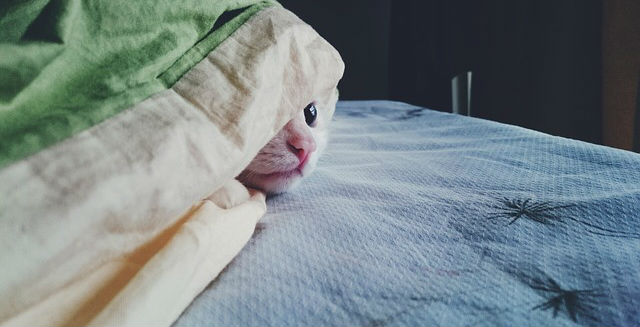What are some tips on how to introduce a kitten to an older cat?
Original Question: We have two cats at home and one is traumatized by the other cat forcing us having to separate them. Additionally, the non-traumatized cat is extremely lonely. I'm debating whether or not getting a kitten would be a good idea. It may allow the traumatized cat a chance at get comfortable with a pet of a smaller size (he is about 7 years old) while also allowing the other cat (about 4 years old) to have a playmate. Do you think bringing in a kitten would be a good idea? - Sabryna
 Mar 5, 2018
Mar 5, 2018
Hi Sabryna,
Thanks for submitting your question.
I personally think it’s a great idea to add playmates to your current pet’s lives. I think this provides a lot of environmental enrichment and daily enjoyment, especially when pet parents need to go to work for long periods of time. However, cats are extremely territorial and there can often be problems if the introduction of a new cat into a defined environment is not done properly. We have a great video about introducing a new pet when you already have pets at home that I encourage you to take a look at.
Here are some strategies on how to introduce a kitten to an older cat that will hopefully l help with the transition.
Generally speaking, the first thing is setting up the environment to accept a new pet. This means understanding that the current pets don’t feel threatened by the newcomer. The introduction has to be very slow and it would be best to create a level of contact that is muted at first, and then slowly increased to the point of physical contact. The best way to do this is to give the existing cats the majority of the house to roam, and placing the newcomer in a separate space, such as a bedroom. You can do this for a few days and then switch the spaces on the pets by letting the newcomer roam free in the house and placing the existing pets into the bedroom that the newcomer was in for a few days. By doing this, every cat gets to smell the other cats first and that is a very muted introduction. After days of this, you can then open the door and allow them to visually see each other and if possible still keep them physically distant from one another. Then make the jump to allowing them to have access to all areas of house together.
Secondly, when introducing a new cat to other cats you need to address their anxiety. The newcomer will be anxious about the new environment and the existing pets maybe anxious about the sounds and smells of the newcomer. So what would be best is to speak to your veterinarian about anti-anxiety options while you are implementing this strategy. There are hormone diffusers that you can plug-in to outlets in your home that have a calming effect on the cats. You can also administer healthy anti-anxiety supplements directly to them or combining it in their food. As a last resort, you could give them anti-anxiety medication to really reduce the stress of the introduction. Supplying an anti-anxiety treatment is imperative particularly when you place the existing cats into a confined bedroom which may cause them quite a bit of stress since they’re used to roaming free in the whole house. Be sure to supply them with toys, clean litter boxes, lots of love, attention, treats, and human contact to improve the chances of success.
If you employ these strategies, I think you may have a good deal of success and these cats will likely become fast friends before you know it.
Best of luck.
Dr. Clayton Greenway


Disclaimer: healthcareforpets.com and its team of veterinarians and clinicians do not endorse any products, services, or recommended advice. All advice presented by our veterinarians, clinicians, tools, resources, etc is not meant to replace a regular physical exam and consultation with your primary veterinarian or other clinicians. We always encourage you to seek medical advice from your regular veterinarian.

